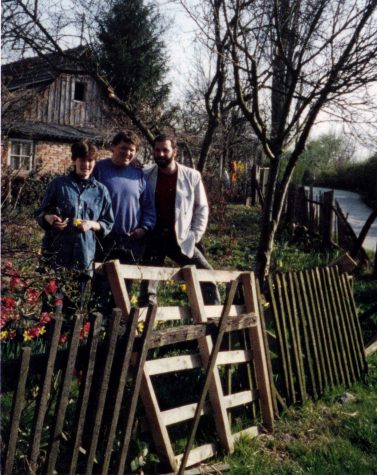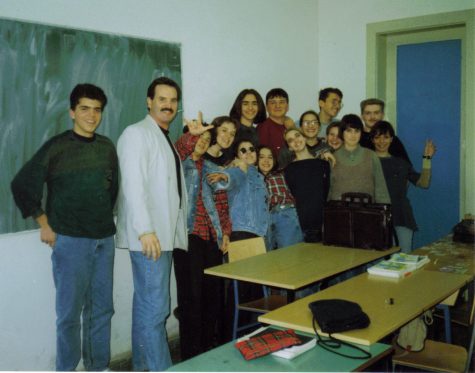Love thy Neighbor, or Suffer The Consequences
Yugoslavia
January 6, 2021
A person who may never have stepped foot into a church would know a Pastor’s job. It’s to preach, maybe to give counsel? But in one Pastor’s eyes are flashes and memories of a past life lived under the disamil rule of communism. Recollections of a tragic war, and people who passed by its ruthless nature. These things are recalled daily.
Might I be painting Pastor Gary Heins’ past memories as too dramatically tragic? No, not in the slightest. As the little known history of the Yugolsalvion wars will be divulged here, and the stark difference between its people when compared to Americans, you will find the wars’ brutality can never be exaggerated.
Many dream of travelling to Europe, seeing its beauty and people. (Though romanticized dramatically) It’s a common idea, but one which has gripped me as well. And often unheard of is a little slice of Eastern Europe formerly named Yugoslavia; possibly most famous for being the start of WW1. Yugoslavia is hidden under Austria and Farrey’s ride across from Italy.
This is where Gary Hein makes his entrance. A Pastor, a middle aged man with graduated kids and a peaceful life, though as far too many can say, it wasn’t always this way.
Re-enter Gary Hein, a young man in 1986 who has freshly abandoned his studies in veterinary medicine school and is bound for a communist Yugoslavia. He was a new Christan and his intention was to be a missionary in the closed off country.

Gary passed four years in this dot of Eastern Europe, “Getting my mail outside the country.” and, “No one calling me on the phone.” Gary’s friends worked the corrupt system, resourcefully slipping past the government through a non-criminal black market. As Gary put it, “Why would you pay 60% more when Mierco over here can it to you for 60% less?”
Though, Gary was mostly occupied with his missionary work. “I would go out to villages, I had friends that I made as I was wanting to talk to about Jesus–I developed deep friendships. And I would go out to their villages and cut wood with them, and then help their parents. And in this small tiny village of 20 houses, they all lived peacefully together. And there were Serbians and Croatians there.”
A fundamental point has been mentioned, the Serbians and the Croatians. The Serbs are Islamic, the Croats are Christan. The Serbs use Cryllic letters and the Croats use Latin. The Serbians lived in Serbia and the Croations lived in Croatia, that is until WW2 forced them into the same living quarters. (Along with the four other republics surrounding them.)
And more notably most of the history either country has involves having a war with the other. So why do they hate each other so ferociously? Gary could not say and neither can most historians. “Nobody knows the answer.” He took the perspective of a native, “500 years ago there was a war and 700 years ago there was a war and 400 years ago, there was a war, and they did terrible things to us, so we hate them!’
 “And, and so you, so you could read big books on it, and it would give you all those wars, and it would bring you up to the very current day. But it’s all the same version of that story.” No answer is truly, truly able to be provided. All one needs to remember is that Serbs and Croats, historically, are like oil and water.
“And, and so you, so you could read big books on it, and it would give you all those wars, and it would bring you up to the very current day. But it’s all the same version of that story.” No answer is truly, truly able to be provided. All one needs to remember is that Serbs and Croats, historically, are like oil and water.
May you be reminded, throughout these four years of Gary living in Yugoslavia no war ran amuck. Yet the fragility of the six republics revealed it’s cracks through the course of one car ride.
“I was done with my time there [In Yugoslavia] and I was coming back to America. Just before I came back I was riding with my friends to a wedding. The one guy was going to get married and another guy was driving. We’re driving to the wedding and the radio turned on. The radio talked about, ‘The Serbians had taken over a T.V station in this one part of the country.’ They [my friends] exploded with reaction. And I said ‘What? What’s going on?’ They said, ‘This is the beginning, this is how it happens, you take over communications…They are moving us towards war.’”
“They were in shock. It was horrific. But they expected it.”
As the first attacks of the ensuing war began their course Gary returned to America. He happily married a woman named Suzie. Yet a mere 2 years later the newlyweds journeyed back to Yugoslavia. While in the heat of modern warfare, while people fled, he returned. And much to the dismay of the couple, the country had been very much changed.
The ‘dot’ of Eastern Europe was separated once again. The six republics which pieced it together now in feverish and violent bickering, bickering which did not exclude civilians from it’s wrath. Personally, the momentus attack on Vukovar (A city in Croatia), for lack of a better word, is one which wounded Gary.
“They [Serbians] ended up slaughtering all of the Croatian’s there [In Vukovar] and one of them was my very good friend, Throg.”
What injustice! In such a modern age! How did this happen?! Well, Gary feels someone near and dear to us is, somewhat, responsible. He said, “It’s my belief that if America would have came and said ‘Stop, turn your tanks around or we’re gonna blow them up,’ The war wouldn’t have started.”
The war wouldn’t have started. The war wouldn’t have started. The people would’ve been saved.
 Remember the quaint village of Serbians and Croatians? Gary and Sue did, those were their friends. As the civil war rang it’s bell of chaos it was to their friends they returned. “When the war started, one other person who went fishing every day with another person, and had a key to their house, they went into their house and killed them, because one was Serbian and one was Croatian. And when I went back at the end of the war, and I asked my friends, ‘How did that happen, how is that possible?’ And their answer was, ‘Well, they’ve always hated each other. When his grandfather burned down his house, his grandfather stole that cow.’”
Remember the quaint village of Serbians and Croatians? Gary and Sue did, those were their friends. As the civil war rang it’s bell of chaos it was to their friends they returned. “When the war started, one other person who went fishing every day with another person, and had a key to their house, they went into their house and killed them, because one was Serbian and one was Croatian. And when I went back at the end of the war, and I asked my friends, ‘How did that happen, how is that possible?’ And their answer was, ‘Well, they’ve always hated each other. When his grandfather burned down his house, his grandfather stole that cow.’”
“There’s decades, centuries of animosity, and I’m just supposed to kill them. ‘That’s, that’s what we do, because it’s time. This is revenge for all the horrible things they did.’”
“And I believe ultimately, and this isn’t an answer anyone else will believe, I ultimately believe that there are evil forces that have set up camp and captured people’s hearts and souls and had them believe that evil is the right way to move. And ‘We are oppressed, and so we should kill. We have a right to kill other people.’ That’s the larger story here right? Each of them would think the other is at fault.”
There is no happy ending; nothing I can write to console any disturbance or sadness you’ll feel from knowing these events have passed…the tragedies of the little dot in Eastern Europe. But why should anyone be comforted after learning of this affliction?
“It’s just in America we don’t do that. I mean I can’t imagine going over to my neighbor and killing them.”
Though perhaps these next words may tie together the loose ends the civil war has left.
27 years after the war, what shape is the torn Yugoslavia in? Fortunately, I know some people who would know the answer. The Hartmans.

The Hartmans are an American family who live on the welcoming mat of Eastern Europe. They have an upbringing of Americans but the perspective of Europeans. Again, 27 years after the war, what shape is the torn Yugoslavia in? Let’s not forget our little friend communism who possibly helped implant the early seeds of war. I found the iron fist of communism has had a stubborn lasting power, described here by Mr. Hartman.
“There’s a mindset by some that are older…just some of the mindsets [of] authority and shame and how you gain authority to use power, that’s a very interesting concept…There is this sense of shaming and use of power…There’s this level of respect that people have to show, but it’s gained by shaming people and by using power. Their way they teach, their philosophy of teaching is very much from a communistic background.”
“I’ve seen it in sports where I was helping the basketball program. And the coaches are more like drill sergeants. I mean like Asher [The Hartman’s 15 year old son] was 11 years old, 12 years old, and his coaches were just screaming and yelling at these kids as if they were college students, sometimes even showing violent acts of like throwing a ball at a kid that’s not paying attention, yelling at him, kicking him out.”
Mrs. Hartman said, “I think too another thing that we see is, the adults that can remember communism, they have a little bit of distrust.”
Mister added, “Because of that it’s very skeptic. Yeah, the communistc impact on the older generation and even some of that is caught by some of the younger generation, is skepticism…Because there’s a sense of-of closeness and if you’re not in that circle of trust and relationship then you don’t have a right to actually even speak to someone in an informal way.”
“I think part of the communistic social impact is this sense of skepticism being relational and you don’t trust people [not] in your circle.”
What does this have to do with anything? Well, it shows that the salt of communism has flavored the mindset and culture of many Eastern Europeans. It instigated and mixed the war into a nasty set up, and though the war has passed, the ‘salt’, obviously, remains.
What is the point in learning this all? Most definitely not to paint Yugoslavian’s or Eastern Europeans as some barbarians, because we are as human as they are.
I’ve come to the conclusion that in America we don’t understand how fortunate our history is. Our country is founded on one group of people who came together and forged a new life.
No matter the politics you believe in or the color of your skin, each American’s blood is rooted in the history of unity our country represents. And whether we know it or not, each one of us has a deep brother or sister hood with each and every other American. So when strippped down to our minimum, Americans are one common ancestor of people seeking total freedom. Whether that ancestry is derived from the pilgrims or immigrants, a heritage of slavery or even the Dutch, we all are unchangeably united.
For a Croation or a Serbian, living in the same village and working together can never wipe clean the thousands of years of hatred weaved into their past. As sad as it may be, it’s what history has testified to. Historians say the root of their rivalry can be traced back to the distinction between the Latian and Cyrillic alphabets. Americans, we can never understand this.
However, Gary and countless others can. They understand a magnitude of hatred which they’ve seen play out. And the Hartman family know’s of its aftermath. Let us be glad we only need to have empathy for those who’ve seen the war, and appreciate the unity of our nation.

